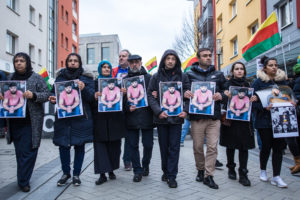Dear IRR News subscriber,
Two issues, as reflected in our fortnightly calendar of current affairs, have dominated the news this week. The first is the introduction in the UK of a new Australian-style immigration points system; the second, the shooting dead of nine people, all from an immigrant background in the west German city of Hanau.
The IRR is concerned that the government’s complete ban (except for a small number of seasonal agricultural workers) of low-skilled immigration to the UK, when coupled with an English-language proficiency requirement, will encourage the kind of overt racism we saw on ‘Brexit day’ when a Norwich housing block was covered with posters telling residents to only speak English. The proposals, which also include a general minimum earnings threshold of £25,600 for work visas, have already caused distress and anxiety to those reliant on carers, all of whom are low-income and (insultingly) categorised as low-skilled, and to anti-trafficking charities, which foresee more exploitation for migrant workers trapped in illegality.

What is particularly haunting about images from protests in 50 German cities against the far-right killings in Hanau, is the sense that recent history is repeating itself. The faces of the grieving mothers, fathers, brothers and sisters who led the Hanau march bring to mind the families of the three girls and two women who died in 1993 in a far-right arson in Solingen, or the families of the eight Turks and Kurds who, in the early 2000s, were assassinated by the neo-Nazi National Socialist Underground. All these attacks were accompanied by institutional failure and thus reflected the second-class status of Germany’s Turkish and Kurdish communities. Media reporting on far-right killings tend to be dominated by counter-extremism experts who have very little knowledge of the long struggle of Germany’s Turkish and Kurdish communities against this systemic racism. Tarek Younis, who grew up in Berlin, makes telling points along these lines in his own powerful blog this week.
Another powerful intervention, this time concerning knife crime in London, and how, and how not, to fight it, comes from IRR’s Jessica Perera who critiques recent Greater London Authority initiatives on youth violence and the government’s public health approach to knife crime. Jessica warns that both approaches are doomed to fail if the hidden psychosocial trauma, that gentrification induces in young people scratching out a living in the cracks of what remains of London’s working-class multicultural neighbourhoods, is ignored.
Coincidentally, Tarek Younis is one of the speakers at the second of IRR’s ‘State Racism, Public Health and Policy Harms’ seminar series. He will be part of a panel that on March 16 will be discussing the criminalisation of identity in Prevent and anti-gangs initiatives. Find out how to register here.
IRR News Team

